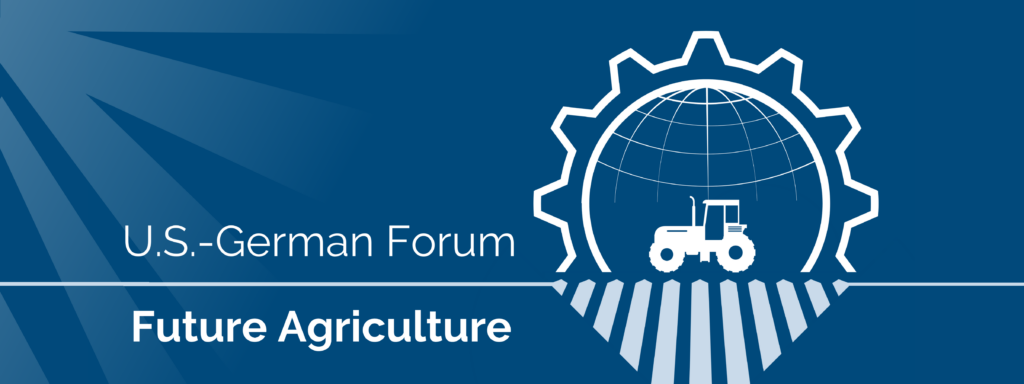
Study Tour in Champaign-Urbana, Illinois
From June 27th through July 1st, Aspen Institute Germany held the first in-person meeting of its U.S.-German Forum Future Agriculture 2023 cohort in Champaign-Urbana, Illinois, together with implementing partner, the University of Illinois Urbana-Champaign. The project aims to promote transatlantic dialogue on common challenges for the field of agriculture and rural regions and pave the way for a more sustainable agricultural future. The group of 16 farmers and agricultural stakeholders from research and business spent three days exploring best practices for sustainable agricultural policy and practice. Participants had the opportunity to conduct site visits and meetings with local farm operations, agricultural researchers, regulatory agencies, policymakers, and businesses. This in-person meeting follows a series of online workshops and events, which began in February 2023, allowing the group to get to know one another and gain background information on U.S. and German policy contexts and the transatlantic relationship around agriculture. In addition to further familiarizing the German and U.S. participants with each other’s perspectives, experience, and expertise, the group spent time together in Illinois developing policy recommendations around the core topic of climate and agriculture and fostering a more economically, politically, socially, and environmentally sustainable future for agriculture and rural regions overall.
To kick-off the official start of the program, the project hosted a roundtable panel discussion with Illinois state Senators Chapin Rose (IL-51) and Senator Paul Faraci (IL-52) and Molly Hammond, Deputy State Director for Rural Affairs at the United States Department of Agriculture. The discussion, hosted on the campus of the University of Illinois Urbana-Champaign campus, centered on the challenges for agriculture in Illinois and opportunities for bipartisan progress on agricultural policy. Thereafter, participants had the opportunity to visit an agrivoltaic farm and learn about the use of robotics in farming at the University’s Crop Sciences Research and Education Center with researchers from the Institute for Sustainability, Energy, and Environment (iSEE). The group spent the afternoon with the Midwest Center for Precision Agriculture at Parkland College, where the group heard more about precision agriculture and agricultural education and training in the U.S. context. The first day concluded with a dinner with special guest, Astrid Jakobs de Pádua, Minister Counselor of Food and Agriculture at the Embassy of the Federal Republic of Germany in Washington, D.C., who provided insights on the transatlantic relationship around agriculture.
On the second program day, the group ventured to Springfield, Illinois, where they had a chance for a cultural stop at the Lincoln Home and Heritage Site, before a meeting at the Illinois Department of Agriculture, where the cohort learned about the department’s international marketing programs and sustainability initiatives. Participants were then invited to visit a local farm near Gibson City, Illinois. Rick and Aizza Kerchenfaut’s farm is organic and uses many regenerative practices like prairie strips, rotational grazing, and controlled traffic. Liz Rupel, from the Illinois Stewardship Alliance, joined to give a policy perspective on initiatives to incentivize regenerative practices in Illinois. A subsequent tour of Dallas Glazik’s local value-added business, Silver Tree Beer & Spirits, which uses grain from his family farm was another highlight. To close out the day, the group welcomed Dr. Andres Ferreyra, Data Asset Manager at Syngenta Digital and the Co-Lead of the International Organization for Standardization’s Strategy Advisory Group (SAG) on Smart Farming. Dr. Ferreyra discussed the importance of international standards for emerging technologies and focused on how global standardization in agricultural data protocols and measurement are highly important for avoiding conflict internationally in fields such as carbon offsetting and climate accountability.
On the final day, the cohort visited the Realizing Increased Photosynthetic Efficiency (RIPE) Project and its sophisticated High Throughput Phenotyping Facility. Katherine Meacham-Hensold and David Drag gave insight into the project’s goal to solve the global hunger crisis by increasing crop yields through genetic editing of photosynthetic processes. Following the tour, participants met with Blake Giles, Head of the Bayer Crop Science Innovation Center, explaining how the center supports using the latest tools to drive agricultural innovation. The group spent time in an internal workshop developing policy recommendations, before visiting Clearview Farm, where Jim Goss and Sophia Hortin welcomed the participants to a tour of their experimental regenerative farm, which serves as an important center for community education. The next program point featured Riggs Beer Company, a local business that leads the regional brewing industry in vertical integration of local grains and in environmentally sustainable brewing. Finally, the group convened at a local farm for a dinner hosted by the Champaign County Farm Bureau. The chance to have conversations with local agriculture leaders, enjoy classic U.S.-American cook-out food, and a midwestern sunset was the perfect end to a fabulous few days in Illinois.
Although the in-person segment of the project’s 2023 cohort has come to a close, the work to finalize policy recommendations for the core topic of climate-smart and sustainable agriculture at the national and transatlantic levels will continue with further virtual meetings. These recommendations will be published in fall 2023 and presented and discussed with field leaders and policymakers during a public event on September 27, 2023. The U.S.-German Forum Future Agriculture will host a second cohort in 2023, which will bring together cattle and dairy farmers from northwestern Germany and the Northeastern U.S. and focus on digitalization as its core topic. For more information about the project, please visit: www.aspeninstitute.de/future-agriculture.
The project is supported by the Transatlantic Program of the Federal Republic of Germany, funded by the European Recovery Program (ERP) of the Federal Ministry of Economics and Climate Protection (BMWK).






